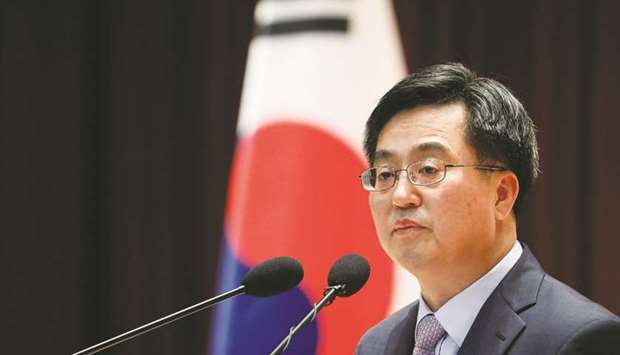Speaking to Bloomberg Television’s Haslinda Amin on Saturday after the China-led Asian Infrastructure Investment Bank held its annual conference on a South Korean resort island, Finance Minister Kim Dong-yeon said that while there were still some “delicate issues” between the two countries, economic cooperation had been traditionally good and he looked forward to a “jump up” in relations.
The AIIB gathering on Jeju Island, the lender’s first annual conference to be held outside China, “can be a good sign for an improvement in the relations,” Kim said.
Relations between the two countries soured after former South Korean president Park Geun-hye decided last year to implement a US missile shield in response to provocation by North Korea. The backlash from China, which sees the Terminal High Altitude Area Defence system as a risk to the security balance in the region, has been wide-ranging. It banned package trips to South Korea by Chinese citizens, heightened customs scrutiny of Korean goods, and suspended some discount stores in China run by Lotte Group after the retailer provided a golf course for the US to use to deploy Thaad.
Kim said he hoped his bilateral meeting with Chinese counterpart Xiao Jie during AIIB and the two countries’ dialogue channels would soon lead to an easing of non-tariff barriers and restriction on package tours. It was the first meeting between the two nations’ finance chiefs since July 2016.
Kim said the Korean economy is in “relatively good shape” as exports grow and construction investment booms. If the economy continues as it is and a supplementary budget submitted to the parliament is fully implemented, growth this year can exceed the government’s 2.6% projection, according to Kim.
Kim added that government will also consider uncertainties like any further US rate hikes before making a final decision on any revision to GDP.
The finance ministry is set to release updated growth and inflation projections later this month. The government recently submitted an 11.2tn ($9.9bn) extra budget proposal to parliament, which would be key to achieving President Moon Jae-in’s electoral pledge to create more jobs.
One of the risks facing South Korea’s economic performance is rising global trade protectionism. President Donald Trump has said he wants to renegotiate or terminate the Korea-US free-trade agreement that took effect in 2012.
Kim said the government hasn’t received an official request from the US to renegotiate the pact, which has been mutually beneficial.
Kim said even if the Federal Reserve continues to raise US interest rates, the upper band of which is now on par with South Korea’s 1.25% benchmark rate, the Korean government is prepared to handle any resulting market reaction.
Kim, 60, who was a civil servant for about 30 years through 2014 before becoming president of Ajou University, was appointed finance minister by President Moon
on June 9.

